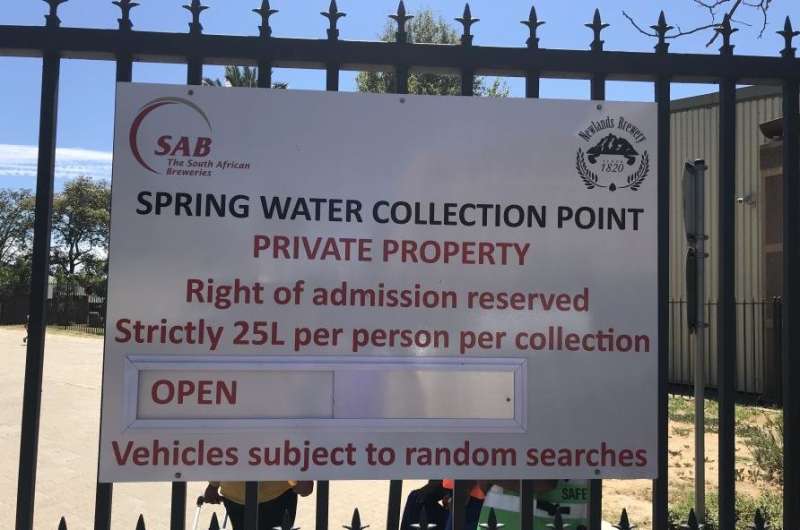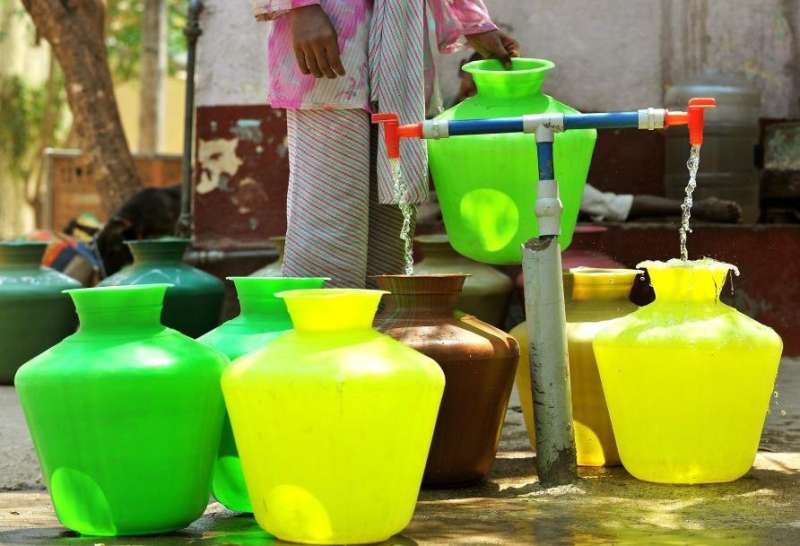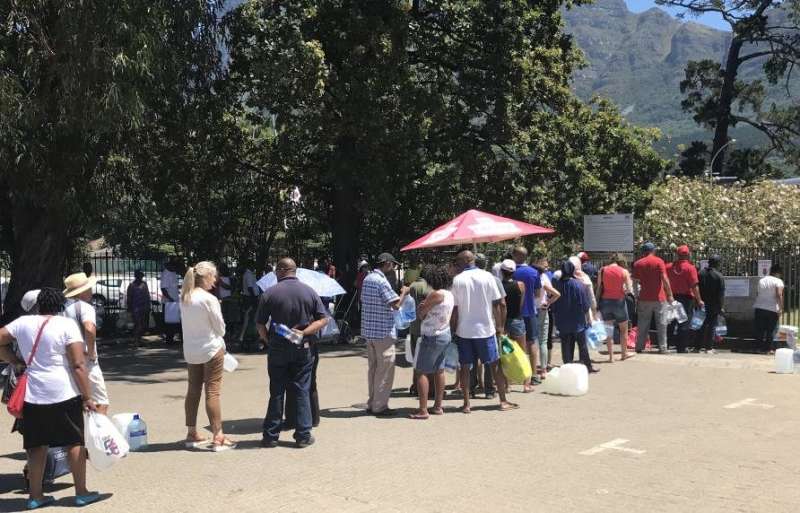Will water ever be worth more than oil?

Nature has declared that the world's supply of water is fixed. As a means of keeping humanity alive, it has no substitute.
Recently, Cape Town has become painfully aware of the value of water.
The unwelcome combination of a once-in-a-century drought, a booming population and a relatively inflexible water supply, means the South African city will have its taps turned off on 9 July. The dreaded Day Zero will mean people will be forced to queue for their water under police or military supervision.
Experts say that Cape Town could be the first of many cities around the world to experience the brutal reality of water demand far outstripping supply.
It raises a particularly dystopian question: could water, one of the world's most abundant resources, ever be more expensive than one of its rarest, oil?
"It already is," says Dr Brian Cook, a researcher in Development Geography.
He's right.
In Australian supermarkets, a bottle of Mount Franklin Spring Water costs around $3.33 a litre. At the pumps in mid-February 2018, the average cost of a litre of unleaded petrol is less than half that, at $1.38.
The end of days already stalks our supermarkets.
Of course, Dr Cook stresses, it is more complicated and less alarmist than that. Unlike petrol, clean drinking water is available from a drinking fountain or a tap, in some instances for free.
"My point is that context matters," he says. "In certain contexts, water is already more expensive than gas or petrol. It has to do with where you are, how much you are purchasing, and whether your country subsidises that resource."
And it depends how a country values that resource: is it a commodity or a right? Most countries seem to agree that water is a right, keeping it cheap or free to access.
For example, during the current crisis in Cape Town, now officially decreed a natural disaster, the price of bottled water has remained at the same levels as it was before the drought.

"If we want things to be cheap, society has pretty good ways of doing that," says Dr Cook. Politicians can use economic levers such as tax breaks, subsidies and tariffs to do this.
"Some might suggest it is the market that drives this, but the value of things is a social construction."
However, market forces could soon test our commitment to cheap water as a human right.
Economist Dr David Byrne says that political sensitivities around water keep the cost low to ensure universal access. "However," he adds, "the bigger question becomes, in the long run, how hard do we stick to those beliefs?"
The temptation for water-rich countries is the creation of an international water market.
Unlike valuable commodities like oil and gold, there is no explicit global market for water and therefore no agreed universal price for trading.
But should one arise, says Dr Byrne, this could cause the domestic price of water to escalate rapidly.
"Areas such as China and India, or in the longer term, Africa are developing rapidly," he says. "They have booming populations that require fresh water to live and they might be willing to pay exorbitant amounts for fresh water from places like Canada, even though it is regulated.
"That asks the question: do governments need to secure water resources for their own countries, and then exploit their water resources for economic benefit just like any other resource like oil or minerals? There's no reason why that wouldn't happen in the case of water and the price overseas could go through the roof."
However, even if governments try to keep water prices low for its own citizens, Dr Byrne says an international water market could still overheat domestic prices.
He cites the example of gas prices in Australia, which are tied to international demand. Despite having the second biggest reserves of natural gas in the world, domestic prices in Australia are high because it is being sold at a premium to gas-poor countries.
"Why? Because there was a signal to the market," says Dr Byrne. "We have cheap gas here, huge demand elsewhere, we have invested in expensive new gas platforms, and all of a sudden the international market has a say."
The international water market may still be unrealised, but Australia is one of the few places in the world where there is an agreed price of water.

A limited water market began in the 1980s in rural Victoria, tightly regulated by the Department of Agriculture and Water Resources, allowing water to be moved to its most economically productive areas.
It was eventually expanded across the Murray-Darling basin, with water moving among rivers and catchment lines to the irrigators, farmers, and environments with greatest need. Its annual turnover is now worth between A$1 and A$3 billion.
According to Dr Angus Webb, from the Environmental Hydrology and Water Resources in the Department of Infrastructure Engineering, the market is "revolutionary on a world scale".
By following classic supply and demand principles, he says, the price of water in rural Australia accurately reflects its value. It is expensive in years of drought, cheap in years of plenty.
"The price fluctuates widely, but not quickly, depending how much water is in the system," says Dr Webb. "I wouldn't be exaggerating to say it could fluctuate by a factor of ten between the high and low prices on the temporary water market."
During the Millennium Drought that hit Australia at the turn of the century, the price of a megalitre (one million litres) of water reached A$1000. In years of abundant rainfall, the price hovers around A$80.
At the height of the drought, in 2006-07, it meant that water was more valuable to farmers than another day-to-day commodity: milk.
Dairy farmers in the Goulburn catchment, part of the Murray-Darling basin, mothballed their operations when their water quota became more valuable than the operational costs and sale of their milk.
They sold their allowance on the water market to producers of more expensive, water-hungry products, such as almond horticulture, giving the dairy farmers an income. Once water became more abundant and the price fell again, the dairy farms resumed operations.
Some experts believe that without the water markets, both the dairy and the horticulture industries in the area would have collapsed.
Yet some are uncomfortable with market forces leaking into water management.
Dr Cook warns that treating water as a commodity threatens its future as a resource available to all.
"I just hope that we debunk the notion that we need to commoditise something to conserve it," he says. "That argument is lovely but simplistic. Almost all the research shows that as soon as you put a value on something, people want to use it.
"But the truth is, if you live in a capitalist society, water is already a commodity. But, I hope that we don't swing too far and abandon the aspiration that water is a human right."
Provided by University of Melbourne


















